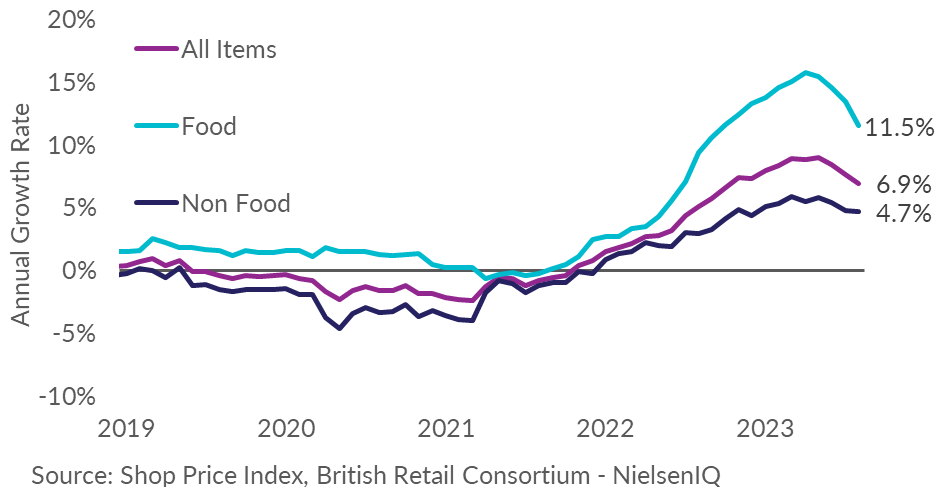Responding to the BRC-NielsenIQ ‘Shop
Price Index’ (see below) which showed shop price inflation
continuing to ease, including a marked fall in the rate of food
prices inflation, Neil Johnston, Director of the Northern Ireland
Retail Consortium, commented:
“The overall fall in shop price
inflation is good news. Most welcome is the fact that food
inflation has come down by almost 2% since this time last year –
as food prices impact most heavily on the least well
off.
“We must not be complacent, however.
It is not inevitable that inflation will continue to decline.
Local decision making can help, however. What we need to see now
is leadership – including from politicians at Stormont and on our
local councils - to keep business costs down and to help
retailers bear down on inflation, ideally with a freeze to
business rates next Spring.
“The leaders of the main political
parties ought to be writing to the Secretary of State, Chris
Heaton Harris saying that, regardless of whether an Executive is
formed by the end of the year, they would support another freeze
in the regional rate for businesses.”
“Local councillors too should be
working to see how they can freeze their part of the business
rate. Last year while many councils continued to talk about
regenerating their towns and local economies, they actually
increased their part of the business rates by over 7%. Clearly,
this simply puts added pressure
on businesses and makes it
harder to keep down prices.”
BRC-NIELSENIQ SHOP PRICE INDEX – August 2023
Food inflation falling fast
Period Covered:
01 – 07 August
2023
- Shop Price annual inflation decelerated further to 6.9% in
August, down from 7.6% in July. This is below the 3-month average
rate of 8.0%. Shop price growth is at its lowest since October
2022.
- Non-Food inflation remained unchanged at 4.7% in August. This
is below the 3-month average rate of 5.1%.
- Food inflation decelerated to 11.5% in August, down from
13.4% in July. This is below the 3-month average rate of 13.6%
and is the fourth consecutive deceleration in the food category.
Food inflation is at its lowest since September 2022.
- Fresh Food inflation slowed further in August, to 11.6%, down
from 14.3% in July. This is below the 3-month average rate of
13.8% and is at its lowest since August 2022.
- Ambient Food inflation decelerated to 11.3% in August, down
from 12.3% in July. This is below the 3-month average rate of
12.2% and is the lowest since January 2023.
|
|
OVERALL SPI
|
FOOD
|
NON-FOOD
|
|
% Change
|
On last year
|
On last month
|
On last year
|
On last month
|
On last year
|
On last month
|
|
Aug-23
|
6.9
|
0.5
|
11.5
|
0.6
|
4.7
|
0.4
|
|
Jul-23
|
7.6
|
-0.1
|
13.4
|
0.3
|
4.7
|
-0.2
|

Helen Dickinson, OBE, Chief Executive of the British
Retail Consortium, said:
“Better news for consumers as shop price inflation in August
eased to its lowest level since October 2022. This was driven by
falling food inflation, particularly for products such as meat,
potatoes and some cooking oils. These figures would have been
lower still had the Government not increased alcohol duties
earlier this month. Across Non-Food categories, toiletries and
cosmetics saw price growth ease as many key components became
cheaper, meanwhile inflation for clothing and footwear increased
as retailers unwound their extensive summer sales.
“While inflation is on course to continue to fall thanks to
retailers’ efforts, there are supply chain risks for retailers to
navigate. Russia’s withdrawal from the Black Sea Grain Initiative
and its targeting of Ukrainian grain facilities, as well as poor
harvests across Europe and beyond, could serve as potential
roadblocks to lower inflation. A potential £400m hike to business
rates bills from next April would certainly jeopardise efforts to
tackle inflation unless the Chancellor intervenes.”
Mike Watkins, Head of Retailer and Business Insight,
NielsenIQ, said:
“The unpredictable weather of recent weeks has dampened consumer
demand with some high street retailers increasing promotional
activity and food retailers continuing to extend price cuts, as
the inflationary pressure coming from supply chains continues to
lessen. Looking ahead, a NIQ survey shows that 60% of households
expect to be severely or moderately impacted by rising household
costs in the coming months so once back from summer holidays, we
expect consumers to remain cautious about discretionary spend
even as inflation decelerates.”
